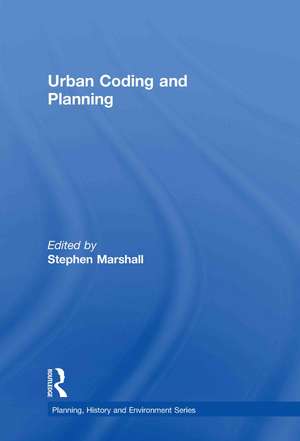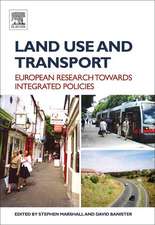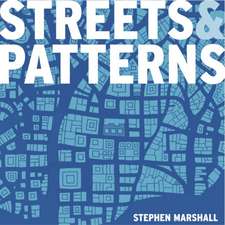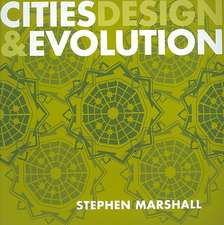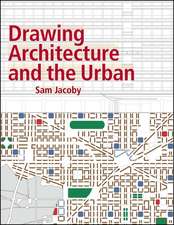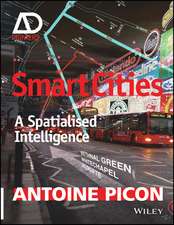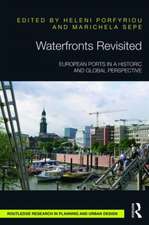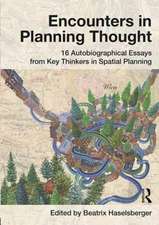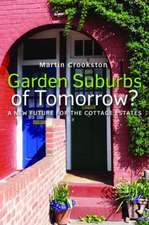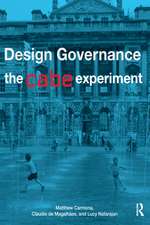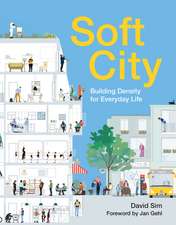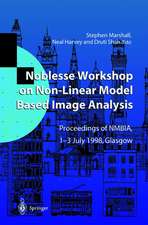Urban Coding and Planning: Planning, History and Environment Series
Editat de Stephen Marshallen Limba Engleză Hardback – 28 feb 2011
In Urban Coding and Planning, Stephen Marshall and his contributors investigate the nature and scope of coding; its purposes; the kinds of environments it creates; and, perhaps most importantly, its relationship to urban planning.
By bringing together historical and ongoing traditions of coding from around the world – with chapters describing examples from the United Kingdom, France, India, China, Japan, Australia, South Africa, the United States and Latin America – this book provides lessons for today’s theory and practice of place-making.
| Toate formatele și edițiile | Preț | Express |
|---|---|---|
| Paperback (1) | 471.33 lei 6-8 săpt. | |
| Taylor & Francis – 28 feb 2011 | 471.33 lei 6-8 săpt. | |
| Hardback (1) | 1276.21 lei 6-8 săpt. | |
| Taylor & Francis – 28 feb 2011 | 1276.21 lei 6-8 săpt. |
Din seria Planning, History and Environment Series
-
 Preț: 306.97 lei
Preț: 306.97 lei -
 Preț: 311.61 lei
Preț: 311.61 lei -
 Preț: 351.55 lei
Preț: 351.55 lei -
 Preț: 332.68 lei
Preț: 332.68 lei -
 Preț: 394.62 lei
Preț: 394.62 lei - 9%
 Preț: 1245.81 lei
Preț: 1245.81 lei - 8%
 Preț: 386.09 lei
Preț: 386.09 lei - 23%
 Preț: 373.92 lei
Preț: 373.92 lei - 26%
 Preț: 766.31 lei
Preț: 766.31 lei - 12%
 Preț: 345.17 lei
Preț: 345.17 lei - 23%
 Preț: 327.26 lei
Preț: 327.26 lei -
 Preț: 424.58 lei
Preț: 424.58 lei - 16%
 Preț: 244.47 lei
Preț: 244.47 lei - 15%
 Preț: 463.82 lei
Preț: 463.82 lei - 18%
 Preț: 949.75 lei
Preț: 949.75 lei - 26%
 Preț: 1017.20 lei
Preț: 1017.20 lei -
 Preț: 416.96 lei
Preț: 416.96 lei - 12%
 Preț: 299.87 lei
Preț: 299.87 lei -
 Preț: 366.46 lei
Preț: 366.46 lei - 18%
 Preț: 1274.88 lei
Preț: 1274.88 lei -
 Preț: 471.33 lei
Preț: 471.33 lei - 12%
 Preț: 302.80 lei
Preț: 302.80 lei -
 Preț: 410.77 lei
Preț: 410.77 lei -
 Preț: 396.33 lei
Preț: 396.33 lei - 18%
 Preț: 1274.11 lei
Preț: 1274.11 lei -
 Preț: 422.04 lei
Preț: 422.04 lei - 17%
 Preț: 245.56 lei
Preț: 245.56 lei - 26%
 Preț: 1018.82 lei
Preț: 1018.82 lei - 15%
 Preț: 461.87 lei
Preț: 461.87 lei - 28%
 Preț: 824.70 lei
Preț: 824.70 lei - 18%
 Preț: 1007.12 lei
Preț: 1007.12 lei -
 Preț: 373.21 lei
Preț: 373.21 lei - 25%
 Preț: 768.30 lei
Preț: 768.30 lei - 26%
 Preț: 990.63 lei
Preț: 990.63 lei - 31%
 Preț: 767.47 lei
Preț: 767.47 lei - 28%
 Preț: 991.70 lei
Preț: 991.70 lei
Preț: 1276.21 lei
Preț vechi: 1556.35 lei
-18% Nou
Puncte Express: 1914
Preț estimativ în valută:
244.20€ • 254.96$ • 202.11£
244.20€ • 254.96$ • 202.11£
Carte tipărită la comandă
Livrare economică 05-19 aprilie
Preluare comenzi: 021 569.72.76
Specificații
ISBN-13: 9780415441261
ISBN-10: 0415441269
Pagini: 272
Ilustrații: 15 tables, 55 halftones and 55 line drawings
Dimensiuni: 156 x 234 x 16 mm
Greutate: 0.56 kg
Ediția:New.
Editura: Taylor & Francis
Colecția Routledge
Seria Planning, History and Environment Series
Locul publicării:Oxford, United Kingdom
ISBN-10: 0415441269
Pagini: 272
Ilustrații: 15 tables, 55 halftones and 55 line drawings
Dimensiuni: 156 x 234 x 16 mm
Greutate: 0.56 kg
Ediția:New.
Editura: Taylor & Francis
Colecția Routledge
Seria Planning, History and Environment Series
Locul publicării:Oxford, United Kingdom
Public țintă
Postgraduate, Professional, and UndergraduateCuprins
1. Introduction 2. A Chronicle of Urban Codes in Pre-Industrial London’s Streets and Squares 3. The Controlling Urban Code of Enlightenment Scotland 4. The Ideal and the Real: Urban Codes in the Spanish-American Lettered City 5. Paradigms for Design: the Vastu Vidya Codes of India 6. Prescribing the Ideal City: Building Codes and Planning Principles in Beijing 7. Machizukuri and Urban Codes in Historical and Contemporary Kyoto 8. Adelaide’s Urban Design: Pendular Swings in Concepts and Codes 9. Coding in the French Planning System: From Building Line to Morphological Zoning 10. Coding as ‘Bottom-Up’ Planning: Developing a New African Urbanism 11. How Codes Shaped Development in the United States, and Why They Should Be Changed 12. Conclusions
Recenzii
'In Urban Coding and Planning, Stephen Marshall and his contributors investigate the nature and scope of coding; its purposes; the kinds of environments it creates; and, perhaps most importantly, its relationship to urban planning. By bringing together historical and ongoing traditions of coding from around the world – with chapters describing examples from the United Kingdom, France, India, China, Japan, Australia, South Africa, the United States and Latin America – this book provides lessons for today’s theory and practice of place-making.' - Lonaard Magazine, Issue 12, Vol. 2, November 2012
Descriere
Urban codes have a profound influence on urban form, affecting the design and placement of buildings, frontages, public spaces and street layouts. Historically, their use, in conjunction with master plans, has led to some of our best-loved urban environments, while recent advances in coding have been a centre of attention, particularly in Britain and North America. By examining historical and ongoing traditions of coding from around the world – with chapters describing examples from the United Kingdom, France, India, China, Japan, Australia, South Africa, the United States and Latin America – this book provides lessons for today’s theory and practice of place-making.
